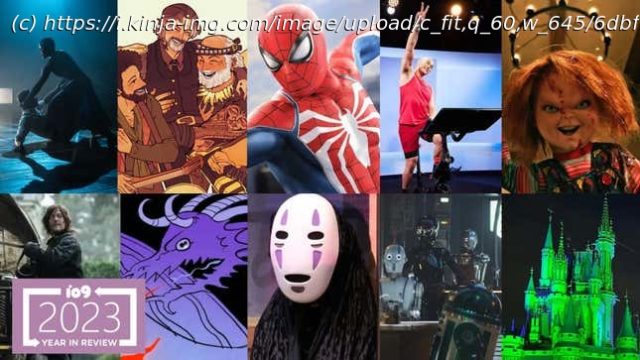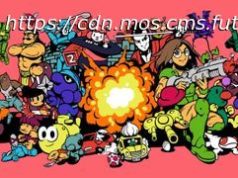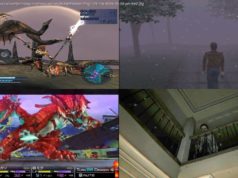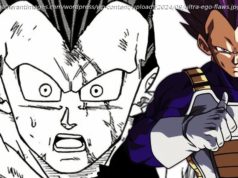Here’s some of the work the io9 team is most proud to have brought you in 2023.
There have been so many words written about the expanse of genre here at io9, and 2023 was a wildcard of a year for entertainment (including Marvel Studios, Star Wars, DC Studios, and Max), theme parks, and games. We covered a lot of ground, from union-strong solidarity during the WGA and SAG-AFTRA strikes to creatively discussing our love for pop culture while highlighting the voices that make it happen.
Here are our favorite staff picks for stories and coverage we had the privilege to bring you this year.
By Linda Codega
The new Dungeons & Dragons Open Gaming License, a document which allows a vast group of independent publishers to use the basic game rules created by D&D owner Wizards of the Coast, significantly restricts the kind of content allowed and requires anyone making money under the license to report their products to Wizards of the Coast directly, according to an analysis of a leaked draft of the document, dated mid-December.
Despite reassurances from Wizards of the Coast last month, the original OGL will become an “unauthorized” agreement, and it appears no new content will be permitted to be created under the original license.
[Read More]
By Rob Bricken
Watching the stage play adaptation of Hayao Miyazaki’s Academy Award-winning, animated masterpiece Spirited Away is a surreal experience. The Studio Ghibli film gets brought to life (literally!) through bunraku puppetry, incredible sets, and astounding practical effects, creating an incredibly faithful adaptation that’s simultaneously original. Also amazing: it was written and directed by John Caird, one of England’s most acclaimed playwrights. With recorded performances about to hit U.S. theaters beginning this weekend, we spoke to Caird about this seemingly impossible task of bringing Spirited Away to the stage.
Rob Bricken, io9: What’s your history with the original movie?
John Caird: I just loved it when it first came out. My wife is Japanese, and we have three half-Japanese children and so I’ve been steeped in Japanese anime culture for a very long time. And when Spirited Away came out, I was just astounded by it. I thought it was not just the best animated movie I’d ever seen, it was one of the best movies I’d ever seen. It’s such a great work of art, so I’d always admired it and it never occurred to me to try to make a theater piece out of it. That came much later, but I’ve always thought it was beautiful. I’ve seen it countless times.
io9: When did the idea of adapting it as a play occur to you, and what gave you the idea?
Caird: It was 2018—something like that—and I was searching for new ideas to put into the Imperial Theater in Tokyo which is a very big space that Toho owns and they’re always looking for big projects to go in it. And I was thinking, you know, what’s the next big musical going to be? And then I thought, well, what about doing a big play in that? That, and suddenly it occurred to me, you know, usually I’d been doing big Western stuff in there and I thought, let’s do something Japanese. What could we do that’s a really, authentically Japanese story? And then I thought, well, the great storyteller is Miyazaki. So which one of his movies would do it? And as I trawled through them, I thought, well, there’s only one really that will work in the theater and that was where the choice came.
[Read more]
By Germain Lussier
Next month, your Peloton bike is going to take you to a galaxy far, far away. On May 4, the popular fitness brand will release its first-ever Star Wars ride to members everywhere. It’s 30 minutes of fitness set exclusively to the music of iconic composer John Williams and, as anyone who uses Peloton can probably guess, the ride will be led by instructor Sam Yo.
“When we go to a movie, it takes us on a journey,” Yo told io9 at the Peloton Studios in London. “And when you’re in a fitness class, it’s the same thing. You’re going physically on a journey. So I’m adding the layers of those together to give you this immersive experience. And that’s what I love to do.”
Yo is a lifelong Star Wars fan and, six months into his time at Peloton, he first floated the idea of a Star Wars ride. It didn’t take then but a few years later, when putting together a ride for Halloween, he tried something else. “I wanted to put ‘Duel of the Fates’ in somewhere,” he said, referring to Williams’ powerful piece from the end of The Phantom Menace. “With the strings and the choir, the image I get is those doors opening and Darth Maul just standing there. It gives you those chills. So I thought, ‘That’s going in my Halloween ride.’ I didn’t know what the rest of the playlist was going to be, but this is going to be the end and then I’ll just work my way back from that.”
[Read more]
Coverage by Sabina Graves
Here’s a breakdown of the articles that chronicle the Walt Disney Company’s Walt Disney World smackdown with Governor DeSantis.
Disney’s Bob Iger Thinks Disney Movies Got Worse Under Other Disney Bob
Bob Iger most recently shared while speaking at DealBook, and was quoted by Deadline, “the company, while I was gone, decided to take a position against the Don’t Say Gay bill that was moving through the Florida Legislature. I won’t comment about what I would have done or not done, but the company took that position against it. The governor got very, very angry at the company when it took that position and decided to punish the company by basically stripping its rights to a special district around Disney World that had been in place for decades”
He continued. “The question wasn’t even about the [bill, later law]. It was about does a company have a right to free speech. And if it exercises its right to free speech, it should not face retribution.” The situation has devolved into a petty back and forth battle, with DeSantis in particular embarrassing himself while harming his own state’s economy. Since returning to Disney, Iger said he’s expressed interest in speaking to DeSantis—but the interest doesn’t seem to flow both ways. “I offered at some point through intermediaries, the ability to have a conversation with him, but he did not take me up on that offer.”
Read more:
Disney Shifts Focus on DeSantis Lawsuit to First Amendment Violation
Here’s a Breakdown of the Ongoing Disney Vs. DeSantis Battle—and the Latest Updates
Florida Gov. DeSantis Challenges Disney for Immunity From Lawsuit
A Guide to Disney’s Messy Legal Battle With Florida’s DeSantis
Walt Disney Company Cancels Imagineering Move to Florida
Disney’s Bob Iger Asks Florida If It Wants More Mouse Money or Not
Florida Governor Strips Disney of Special District Control
By Cheryl Eddy
Chucky wraps up the first half of its third season tonight before going on hiatus until next year—but the episode, cheekily titled “Halloween III: Season of the Witch,” offers a perfect end point. io9 got a chance to talk to Chucky’s creator, Don Mancini, to learn more about season three’s themes and what’s to come.
Cheryl Eddy, io9: What inspired the Washington, DC setting? Was it intended to capitalize on election anxieties or was there something more going on?
Don Mancini: Well, it was partly that—in the sense that the White House in our culture now is a source of anxiety. I think regardless of where you are on the [political] spectrum, we’re dealing with unprecedented political anxiety in public life. So we knew that just putting Chucky into that was potentially interesting. But I’ve actually been very interested in haunted White House lore for a long time and done some research on it; even separate from Chucky, it was just something I’d been really interested in. I love ghost stories and haunted house stories, and I thought the White House [has] such interesting potential for one that hasn’t really been dealt with much. When it came time to find a new realm for Chucky, I felt like, “Well, why don’t we can just do it with [this season of the show]?” It also has the virtue of challenging our teenage lead characters, because after having dealt with Chucky for two years now, they’re of the subset of Chucky franchise characters who know the truth about Chucky. They know what he’s all about… and they know that they want to kill him.
So putting him in the White House, which is the most secure house in the world, that gives these characters a unique challenge … it’s not the same as like, “Oh, let’s just go down the street and crawl in the back door.” It’s a lot harder. They have come up with a plan. You get a taste of this in episode three during the montage when they’re making their costumes—which the payoff [for] comes in the episode this week. We thought of it almost as like an Ocean’s 11 type of situation where it’s this methodical, kind of tactical plan to get in there.
[Read More]
By James Whitbrook
Are the droids of Star Wars people? From the moment Wuher glowered at C-3PO and R2-D2 and snarled “we don’t serve their kind,” the galaxy far, far away has danced around the powder keg of its android heroes and villains as a fully fledged sentient species. But the more The Mandalorian has engaged with the idea, the more it has put Star Wars’ proverbial foot in its mouth.
In its earliest days, The Mandalorian at least wanted to try and present an intriguing twist on the question of droid personhood. Its protagonist, Din Djarin, was an orphan of the Clone War and harbored a deep-seated resentment of droids, especially combat droids, due to a lingering traumatic experience surviving a Separatist assault that claimed the rest of his family. From the get go, we see Din play with this resentment as, in his career as a bounty hunter, he is repeatedly confronted with the usage of droids, whether as the facilitators of trade or in his unlikely partnership with the assassin droid/bounty hunter IG-11. As Din proceeds to have his worldview challenged over the course of the first season thanks to his adoption of the young Grogu, in turn we see his ability to move on from the familial trauma that created his resentment of droids in the first place. It’s a growth of character that climaxes on an emotional beat during the season’s finale, where Din is willing to have his new ward protected by IG-11, and to feel a profound sense of loss when the droid chose to sacrifice itself to protect its friends in turn.
Fast forward to season three and things have jarringly taken a turn in Din’s attitude to droids. The latest season perplexingly opens with Din, reunited with Grogu after a brief separation that was resolved in an entirely different TV show, possessively insistent that IG-11 was the only good droid in the whole galaxy. He’s desperate to rebuild the droid as a partner to conduct an exploratory mission to the ravaged planet of Mandalore… a quest Din just completely gives up half an episode later, now apparently just fine to have R5-D4 foisted on him, so long as he can constantly disparage the astromech droid for not being suited for the task Din wanted a former assassin model for. All this is weird for myriad reasons, but they’re no longer the core of The Mandalorian season three’s unhinged approach to droids as an individually realized group of beings—it just sets the stage for it, as Din vacillates wildly between believing in The One Good Droid and then constantly berating the one he’s left with.
[Read more]
By Justin Carter
Like all big superheroes, Spider-Man has been played and voiced by a variety of different people over the decades. There’s a certain art to the wallcrawler that a number of voice actors have managed to perfect in recent years, and among those is longtime performer Yuri Lowenthal. Known for a number of roles during the 2000s and 2010s—like Ben 10 and the Prince of Persia in Ubisoft’s Sands of Time trilogy—Lowenthal has voiced the hero starting with Insomniac Games’ Marvel’s Spider-Man.
This week’s Spider-Man 2 sees him voice the hero once again, and while talking to io9, Lowenthal was quite candid about getting to play a Spider-Man who’s been around the block, but still has room to grow as both a hero and a man. Unlike most Spider-Man media, Insomniac’s version of the character moves forward in his life, and Spider-Man 2 sees Peter truly coming into adulthood. Set two years after the first game, it finds him still dealing with the death of Aunt May and figuring out what it means to be a superhero in his mid-20s. Even when the game doesn’t explicitly call attention to it, players and longtime Spider-Man fans can feel the passage of time weigh on this Peter in a way they may not with other incarnations.
Lowenthal described playing this Peter as “a beast unto itself,” largely due to how Insomniac has worked to bind Peter’s superheroic life with his everyday normal life. And by skipping past the origin story to showing a more experienced Spider-Man, Insomniac has been allowed more narrative freedom they previously might not otherwise have. “You get all the stuff you love about this iconic character, and yet the story makes it different enough for you to perk up your ears,” he said of the games’ stories. “This story creates this Peter. By [Insomniac] starting Peter when they did, we still get all the Spider-Man stuff we love—he’s an older Spider-Man, but there’s still something new about it.”
[Read more]
By Rob Bricken
Gary Gygax, creator of Dungeons & Dragons, really wanted to get his money’s worth when it came to the various dice used to play the game. That’s the only possible explanation for the overwhelming number of tables inside the AD&D 1st Edition of the Dungeon Master’s Guide. Gygax wanted players to roll for practically everything, from how religious NPCs could be to how often players would most likely run into a dinosaur in specific climates. It’s wild stuff, but these tables are even wilder.
[Read More]
By Linda Codega
“It is inevitable all of us will see something of ourselves within Link,” says Keroblin, a Zelda fan who first remembers playing Phantom Hourglass in 2007, and identifies as transmasculine and agender. “We’re an active participant even [when] we can’t make narrative decisions, because we get to decide who Link is. It is easy to discover yourself and your gender through a character like this, and to make trans readings, as the lack of traditional gender roles creates, maybe for the first time you’ve seen, a world where all you have to be is kind and brave.”
Today, Nintendo released Legend of Zelda: Tears of the Kingdom; the sequel to 2017’s Breath of the Wild. Both games (and really, all the games in the Zelda franchise) follow a young man named Link who is tasked with rescuing the kingdom of Hyrule from a great evil. Breath of the Wild was an incredibly beautiful, poignant game, full of emotional stories and sidequests; it ushered in an era of exciting new open-world gameplay for the Zelda franchise. Breath of the Wild quickly became a bestseller and later won Game of the Year at the Game Awards. And now, gamers are returning to its version of Hyrule. But some of them have changed.
[Read more]
By Cheryl Eddy
Good Omens is back, thank heaven and hell, and with it Michael Sheen and David Tennant as the angel Aziraphale and the demon Crowley. Ahead of Prime Video’s second season following the cosmic characters created by Neil Gaiman and the late Terry Pratchett, io9 caught up with the fan-favorite stars.
(These interviews were conducted prior to the start of the SAG-AFTRA strike.)
Season one of Good Omens showed us Aziraphale and Crowley hanging out in the Garden of Eden. But as season two’s opening shows us, that wasn’t actually the first time they met. Turns out they had an encounter at the birth of the entire universe—and that’s where their first impressions of each other were formed.
“I think Aziraphale is very struck by Crowley,” Sheen said. “It’s hard to put a finger on what it is, but something about him makes Aziraphale’s ears prick up. And then almost immediately, as is always the way with Crowley, he gets annoyed by him. He gets infuriated by him, he gets intimidated by him. And very worried by him—Aziraphale always finds Crowley a worrying presence. He’s always rocking the boat. We see all those things at play in that first meeting in the second series—where he’s sort of drawn to him and kind of impressed by him, but very worried by him as well. And nothing changes really, as it moves on.”
Tennant reflects that Crowley didn’t quite have the same experience. “There’s certainly no sense to Crowley that this is someone who is going to become terribly important to him, so central to his very existence, but then Crowley’s still an angel at that point. He’s got a long journey to go on before he becomes the character that we get to know,” he said. “[In this scene] we get to see how central they were to the creation of it all—and how misjudged Crowley was in the way that he imagined the hierarchy of heaven to work. So it’s a rather delicious little snapshot that I think also helps to inform their relationship forever, really. And of course, when we then cut to present day, they’re still the same two that met all those millennia before. So it’s a very pleasing little way to open the series. It was the first thing that Neil shared with us of season two, and it just felt immediately ideal, I thought, that was how we should reconnect with these characters.”
[Read more]
By Sabina Graves
This week, DC Studios starts anew with Blue Beetle, officially kicking off the James Gunn and Peter Safran-led superhero slate in earnest with the studio’s strongest film in quite a while.
Directed by Ángel Manuel Soto, Blue Beetle is a bombastic blast that evokes ‘90s-style action and offers a heartfelt origin for a hero the next era of DC moviemaking really needs. A total breath of fresh air—or a sigh of relief—for Warner Bros., its latest attempt at a DC Studios franchise universe lands a strong debut for a new generation. Starting with Gareth Dunnet-Alcocer’s adaptation of Jaime Reyes’ Blue Beetle run is a smart move; the relatively unknown DC hero works perfectly as a gateway into the new worlds of James Gunn’s Gods and Monsters.
Xolo Maridueña (Cobra Kai) is a star in the making leading Soto’s superhero debut. The sheer optimism of Maridueña’s Jaime Reyes as he returns to Palmera City from Gotham’s School of Law with a degree that doesn’t get him the job he expected is instantly relatable, as he discovers that slip of paper his family worked so hard to help him get won’t help them back. With gentrifying corporations at their door and a home on the line, Jaime steps up to help his family by any means possible. Even if that means being a pool boy at the Kord estate, owned by Palmera City’s resident corporate tech overlord Victoria Kord (Susan Sarandon), who’s running her brother Ted Kord’s (the mysteriously missing Blue Beetle) company with aspirations to acquire more global resources for the “greater good.” Yeah, like that’s not a red flag when people say they’re trying to use all the money for a greater good that benefits them, yet also happens to displace marginalized people.






